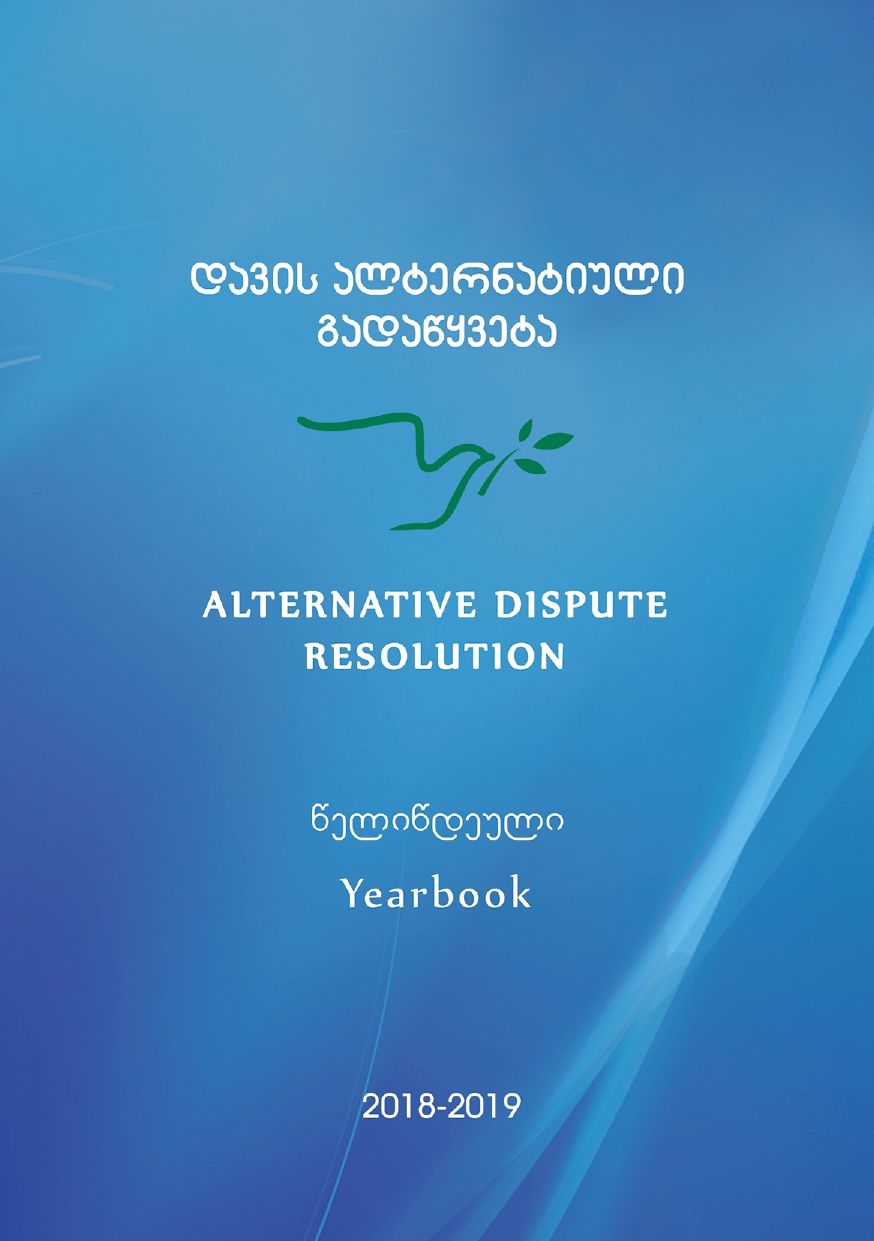The Function of the Judge in Concluding of Civil Case with Settlement and the Results Achieved by Settlement
Keywords:
Settlement, proceedings, judge, judge-arbitrator, mediator, qualification of the judge, competence of the judge, functions of the judge, settlement process, settlement result.Abstract
Settlement, as the basis for concluding of the civil case, is carried out within the court and, consequently, represents the judicial settlement. The initiator of successful settlement is a judge, who shall be involved in the process with the status of “the third passive party” and undertake important function like settlement of disputing parties. The term “judge” is a universal notion, however, following from the obligations, imposed on the judge in the process of settlement, it is appropriate to introduce the term “judge-arbitrator”, which exactly expresses the status of the judge in the process of settlement. Judges- arbitrators must be interested in creating the relevant environment and conditions for settlement in the court room, manage to focus the parties on common objective of settlement, obtain comprehensive understanding of the subject of dispute and interests of the disputing parties, which shall become the pre-condition for successful settlement.
Conclude of the dispute by settlement actually means its resolution, ensures conflict regulation, which is productive resolution of a dispute for the disputing parties as well as for the judicial system. The main basis of conclude of the dispute by settlement is a free will of the parties and the goal of obtaining of the desired result, where conflict regulation, restoration of justice occurs, long disputes are avoided, trust towards the court increases and, besides, the attitude of judges towards settlement changes. Conclude of civil proceedings by settlement brings real result for the disputing parties, which is expressed in mutual satisfaction of the rights and requirements, envisaged by the subject of dispute.
References
The Constitution of Georgia, 24/08/1995.
Civil Procedural Code of Georgia, 14/11/1997.
European Charter on Judge’s Status, Strasbourg, 1998, 8.
Civil Procedural Code of Georgia, 14/11/1997.
The Law of Georgia On Introduction of Amendments and Additions into the Civil Procedural Code of Georgia“, №5669, 28/12/2007.
Code of Judicial Ethics of Georgia, adopted by the Resolution №6 dated June 23 2001 of the Conference of Judges of Georgia.
Bangalore Principles of Judicial Conduct and its comments, Tbilisi, 2015, 219.
Basic Principles on Court’s Independence”, Vol. 2, Tbilisi, 1999, 67.
Comments to the Code of Judicial Ethics of Georgia.
Council of Europe in Co-operation with the Consultative Council of European judges (CCJE), Strasburg, 24 and 25 November, 2003, 70.
Recommendation №R92(12) dated October 13 1994 of the Committee of Ministers of European Council “On Independence, Efficiency and Role of Judges“.
Practical Recommendations for Magistrate Judge, Supreme Court of Georgia Tbilisi, 2008 (In Georgian).
“Principles on Independence of Court”, adopted by the UN 7th Congress on Prevention of Crime and Treatment of Offenders, Milan, August 26 – September 6, 1985.
Abel R.L., A Comparative Theory of Dispute Institutions in Society, Law & Society Review, 1974, 227.
Akhvlediani Z., Mandatory Law, Tbilisi, 1999, 10, 99 (In Georgian).
Alschuler A.W., The Prosecutor's Role in Plea Bargaining, 36 U. Chi. L. Rev., 1968, 50.
Aubert V., Rettens sosiale funksjon, Oslo, 1976, 172.
Baar C., The Myth of Settlement, Paper Prepared for Delivery at the Annual Meeting of the Law and Society Association, Chicago, Illiois, 1999, 2.
Balant T. J., Independence of Court and Judge’s Profession, Tbilisi, 2013, 64.
Basic Directions of Judicial Reform, Supreme Court of Georgia, Journal “Martlmsajuleba” (Justice), №1, Tbilisi, 2006, 26, 28 (In Georgian).
Berghoff E. A., Fieweger M .J., Linguanti T. V. M., Morkin M. L., Vigil A.C. (eds.), Williams P., Stewart M., The International Negotiations Handbook, Success through Preparation, Strategy and Planning, A Joint Project from Baker & McKenie and The Public International Law & Policy Group, 2007, 9.
Bilsky L., Fisher T., Rethinking Settlement, Theoretical Iquiries in Law, 2014, 89.
Birke R., Fox C. R., Psychological Principles in Negotiation Civil Settlements, Harv. Neg. L. Rev., 1999, 1.
Brennan G., The Role of the Judge, National Judicial Orientation Programme, 1996.
Burgess H., Burgess G.M., Encyclopedia of Conflict Resolution, Santa Barbara, California, 1997, 74-75.
Certilman S. A., Judges as Mediators: Retaining Neutrality and Avoiding the Trap of Social Engineering, 2007, 24.
Chachanidze E., Zodelava T., Gogishvili M., Sulkhanishvili M., Communication in the Court, Tbilisi, 2013, 10, 22-23, 74 (In Georgian).
Cornes D., Commercial Mediation: The Impact of the Courts, Tomson, Sweet & Maxwell Limited, 2007, 13, 17.
Cory M.V., Danks Jr., How to Negotiate the Best Settlement, Miller & Cory 213 South Lamar Jackson, MS, 2011, 3.
Crane S. G., Judge Settlements Versus Mediated Settlements, Dispute Resolution Magazine, 2011, 21-22.
Cratsley J. C., Judicial Ethics and Judicial Settlement Practicis, Time for Two Strangers to Meet, Dispute Resolution Magazine, 2005, 16, 17.
Darjania T., Electronic System of Legal Proceedings, Georgian Experience of electronic Justice, Tbilisi, 2015, 6, 21 (In Georgian).
Ervasti K., Conflicts Before the Courts and Court-Annexed Mediation in Finland, Scandinavian Studies in Law, 1999-2012, 190-191, 193.
Floyd D. H., Can the Judge do this? – The Need for a Clearer Judicial Role in Settlement, Arizona State Law Journal, 1994, 48-49, 100.
Gabisonia I., Jury, Magistrate Courts and Conciliation Courts, Tbilisi, 2008, 98, 102, 100, 109, 342, 350 (In Georgian).
Ghibradze D., Relieving Judges and Distribution of Cases, “Court Independence and Judge’s Profession”, Tbilisi, 27/28 September, 2013, 49-61 (In Georgian).
Gilles P., Judicial System from Critical Sight: Comparative Analysis from German Position, “Samartlis Zhurnali” (“Magazine of Law”), №2, Tbilisi, 2009, 232-233, 235 (In Georgian).
Gleeson M., Future of Civil Justice Adjudication or Dispute Resolution, Otago Law Review, 1999, 454-455.
Glover J. M., The Federal Rules of Civil Settlement, Jurnal of International Law and Politics, 2012, 1723.
Grigalashvili N., “Accompanying Spirit”, newspaper “24 Hours”, published on April 20, 2010 (In Georgian).
Jorbenadze R., Mediation, Tbilisi, 2012, 13 (In Georgian).
Khubua G., Theory of Law, Tbilisi, 2015, 60 (In Georgian).
Kiria G., Teoretical-Practical Comments to the Revision of Court Decisions, according to the Civil Procedural Code of Georgia, Tbilisi, 2002, 7, 28 (In Georgian).
Kokhreidze L., Legal Aspects of Judicial Mediation, Journal “Martlmsajuleba da Kanoni” (“Justice and Law”), №4 (39)’13, Tbilisi, 2013, 22.
Kublashvili K., I will be the First Defender of Honest and Unbiased Judges, Supreme Court of Georgia, ‘’Martlmsajuleba”, №1, Tbilisi, 2006, 11 (In Georgian).
Kurdadze Sh., Khunashvili N., Civil Procedural Law, Tbilisi, 2012, 185-186, 195, 298-300, 396, 409, 559-560 (In Georgian).
Tezelishvili S., Legal Encyclopedia, Tbilisi, 2008, 376 (In Georgian).
Todua M., Kurdadze Sh., The Peculiarities of Decision- Making on Civil Cases of Certain Category, Association of Judges of Georgia, Tbilisi, 2005, 80-81 (In Georgian).
Lacey F. B., The Judge's Role in the Settlement of Civil Suits., Education and Traning Series, The Federal Judicial Center, Washington D. C., 2005, 5-6.
Lahav A., Fundamental Principles for Class Action Governance, 37 Ind. L. Rev. 65, 2003, 128, 136.
Lande J., Judging Judges and Dispute Resolution Processes, Nevada Law Journal, 2007, 457-458.
Les A., Cullen B., Settlement and Reform of the Civil Justice System: How Settlement is Changing the Practice of Law, Waikato Law Review, 2009, 39-40.
Liluashvili T., Liluashvili G., Khrustal V., Dzlierishvili Z., Civil Procedural Law, Part I, Tbilisi, 2014, 14, 21, 32, 40-45, 55, 98-105, 226-239 (In Georgian).
Liluashvili T., The Issues of Civil Proceedings in the Practice of Georgian Courts, Part I, Tbilisi, 2002, 114 (In Georgian).
Liluashvili T., Civil Procedural Law, 2nd ed., Tbilisi, 2005, 14, 18, 25, 65, 134, 147 (In Georgian).
Liluashvili T., Khrustal V., Comments to the Civil Procedural Code of Georgia, Tbilisi, 2007, 11-12, 480 (In Georgian).
Lutringhouse P., Methodology of Making Decision on Civil Case, Bakuriani, October 18-21, 2007, 133-135, 138, 143 (In Georgian).
Moffitt M., Pleading in the Age of Settlement, Indiana Law Journal, 2005, 737.
Ostermiller S. M., Svenson D. R., Alternative Dispute Resolution Means in Georgia, Tbilisi, 2014, 15, 123, 136.
Parness J. A., Improving Judicial Settlement Conferences, U.C. Davis Law Review, 2006, 1995.
Pogonowski P., Role of Judges and Party-autonomy in Settlement in Litigation, John Paul II Catholic University of Lublin, – Ol Pan, 2008, 153.
Resnik J., Mediating Preferences: Litigant Preferences for Process and Judicial Preferences for Settlement, Jurnal of Dispute Resolution, 2002, 155- 158.
Roberts K., What Judges Actually Do, Judges' Journal, 2010, 29.
Roberts S., Settlement as Civil Justice, Modern Law Review, 2000, 739.
Robbennolt J. K., Attorneys, Apologies and Settlement Nagotiation, Har. Neg. L.Rev., 2008, 34.
Rubenstein W. B., The Fairness Hearing: Adversarial and Regulatory Approaches, 53 Ucla L. Rev. 1435, 2006, 1452–66.
Sale H. A., Judges Who Settle, Washington University Law Review, Vol. 89, Issue 2, 2011, 385.
Shavliashvili G., City Court Will Become Available and Efficient for Citizen, Supreme Court of Georgia, “Martlmsajuleba”, №1, Tbilisi, 2006, 65-66 (In Georgian).
System Analysis of Judges’ Responsibility (National Legislation, International Standards and Local Practice), Tbilisi, 2014, 85 (In Georgian).
Tchanturia L., Boeling H., Methodology of Judicial Decision-Making on Civil Case, Tbilisi, 2003, 1, 51, 54-56, 89, 90, 92-93 (In Georgian).
The Issues of Ethics of Legal Professions (American Bar Association, the Rule of Law initiative), Washington, 2009, 89-142 (In Georgian).
Tsertsvadze G., Mediation, Alternative Dispute Resolution Form (General Overview), Tbilisi, 2010, 34, 66, 127, 168, 218, 236 (In Georgian).
Tsvetkov V. L., Psychology of Conflict, Tbilisi, 2015, 2013 (In Georgian).
Треушникова М. К. (ред.), Хрестоматия по Гражданскому Процесу, М., 1996, 62 (in Russian).
Ruling dated March 17, 2015 of the Chamber of Civil Cases of Tbilisi Appeal Court on the case: №2B/4963-14 (In Georgian).
Ruling dated June 06, 2012 of the Chamber of Civil, Entrepreneurial and Bankruptcy Cases of the Supreme Court of Georgia on the case: №AS-1770-1750-2011.
Ruling dated September 23, 2010 of the Chamber of Civil, Entrepreneurial and Bankruptcy Cases if the Supreme Court of Georgia on the case: №AS-513-482-10.
Ruling dated November 07, 2008 of the Chamber of Civil, Entrepreneurial and Bankruptcy Cases of the Supreme Court of Georgia on the case: №AS-346-598-08.
Ruling dated October 09, 2008 of the Chamber of Civil, Entrepreneurial and Bankruptcy Cases of the Supreme Court of Georgia on the case: №AS-436-678-08.
Ruling dated September 10, 2008 of the Chamber of Civil, Entrepreneurial and Bankruptcy Cases of the Supreme Court of Georgia on the case: №AS-621-846-08.
Ruling dated June 11, 2008 of the Chamber of Civil, Entrepreneurial and Bankruptcy Cases of the Supreme Court of Georgia on the case: №AS-302-559-08.
Ruling dated March 10, 2008 of the Chamber of Civil, Entrepreneurial and Bankruptcy Cases of the Supreme Court of Georgia on the case: №AS-95-375-08.









